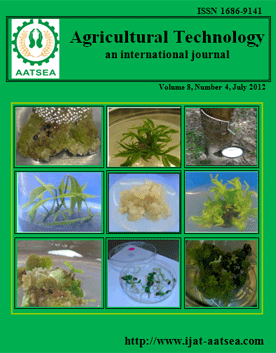ThaiScience
ThaiScience
INTERNATIONAL JOURNAL OF AGRICULTURAL TECHNOLOGY
Volume 17, No. 01, Month JANUARY, Year 2021, Pages 33 - 46
Genetic classification of upland rice (oryza sativa l.) collected from minority farmers in thailand using indel marker
Chimthai, S., Na Chiangmai, P. and Brooks, S.
Abstract Download PDF
Upland rice varieties are the most appropriate for rice production in slope areas under rainfed conditions. Upland rice grows in Northern, Central and Northeast Thailand, but genetic information of this type of rice cultivated by minority farmers is still unclear. Thus, the obtained results helped upland rice breeding program. The 15 upland rice accessions were investigated using 23 InDel markers and molecular results to compare traditional morphology method. The morphological characteristics were identified with perplexing outcome and the genetic information obtained by the 25 InDel markers revealed three major groups among the 15 upland rice accessions. The upland rice accessions PLU SU 0007, PLU SU 0011, and PLU SU 0012 collected from Prachuap Khiri Khan were identified as indica rice. CM 001, SU 001, and PLU SU 002 accessions which were collected from Chiang Mai, Petchaburi, and Prachuap Khiri Khan and identified as japonica rice. The nine accessions showed closely genetic similarity to japonica rice. These data suggested that the InDel marker is an efficient method to classify ecotypes (indica or japonica) of upland rice, while morphology of seed grains failed to identify the 15 accessions. In addition, the upland rice accessions growing throughout Thailand are genetically diverse. This genetic information will provide strong opportunity for successful study of these accessions in vitro and genetic improvement of upland rice.
Keywords
InDel markers, Upland rice, indica, japonicaINTERNATIONAL JOURNAL OF AGRICULTURAL TECHNOLOGY
Published by : Association of Agricultural Technology in Southeast Asia (AATSEA)
Contributions welcome at : http://www.ijat-aatsea.com
